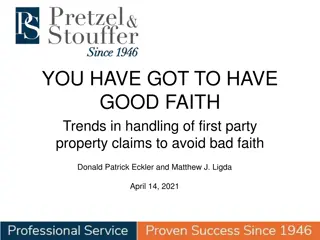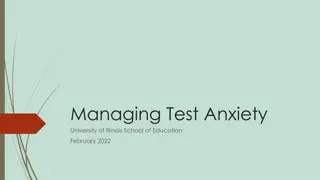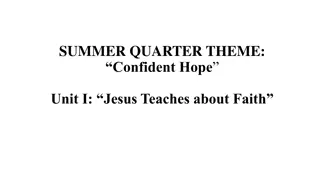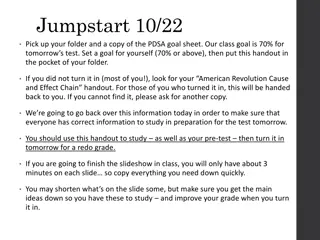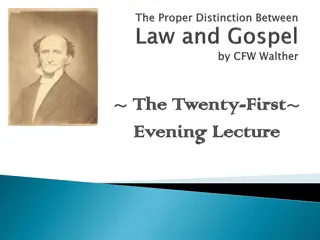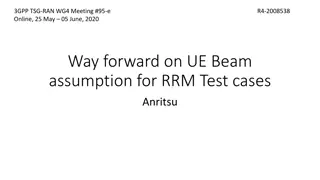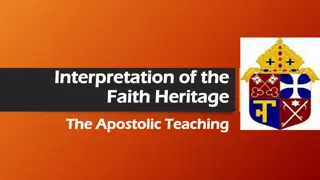
Understanding the Themes and Lessons of 2 Corinthians for Stronger Christian Living
Explore the profound teachings of 2 Corinthians focusing on authentic ministry, apostolic authority, self-examination, and spiritual growth. Dive into the final lessons of maintaining faith, unity, and love amidst challenges, and prepare to face life's tests with the guidance of God's Word.
Download Presentation

Please find below an Image/Link to download the presentation.
The content on the website is provided AS IS for your information and personal use only. It may not be sold, licensed, or shared on other websites without obtaining consent from the author. If you encounter any issues during the download, it is possible that the publisher has removed the file from their server.
You are allowed to download the files provided on this website for personal or commercial use, subject to the condition that they are used lawfully. All files are the property of their respective owners.
The content on the website is provided AS IS for your information and personal use only. It may not be sold, licensed, or shared on other websites without obtaining consent from the author.
E N D
Presentation Transcript
The True Apostolic Ministry The True Apostolic Ministry Passing the Test of Faith Passing the Test of Faith Week 98 31 July 2024
2 CORINTHIANS INTRODUCTION In our final study of Second Corinthians remember the themes of this letter revolves around the theological concepts and the practical aspects of Christian living. The primary issue in Corinth was their failure to recognize authentic ministry and to submit to apostolic authority. Paul wrote this letter to provide guidance and encouragement to help the church navigates the challenges that influenced their unity, discipline, and spiritual growth. In our final lesson, Paul concludes his message to the church in Corinth, in a powerful call for accountability, self- examination, unity, and love. He balances his authoritative warnings with pastoral care and a heartfelt desire for the Corinthians spiritual restoration and continued growth. He closes with a profound blessing, encapsulating the essence of Christian faith and community.
2 CORINTHIANS - LESSON OVERVIEW Swindoll opens this last lesson by reminding us that all of us will be tested! He says from pop tests to blood test, from bar exams to eye exams, testing is a regular part of life. Aside from medical, academic, and professional tests, as Christians we will encounter personal tests of faith such as: Sickness, affliction, broken dreams, failures, peer pressures, moral temptations, and even doubts and fears. However, by turning to God s Word for answers to the most important questions in life. Who is God? What does He expect of us? What should I believe? We can prepare for these tests before they come.
2 CORINTHIANS - LESSON OVERVIEW As we complete our study and work our way through the questions that were presented. We will become increasingly better prepared to handle life s unannounced personal tests when they arrive. Paul, has been building up to this comprehensive final exam for the rebellious Corinthian church that includes: An objective outside evaluation (13:1-4). A call for them to examine themselves (13:5-6). If they follow through on these exams and shore up their shortcomings. They will be complete in Christ, and built up in their faith in the triune God.
2 CORINTHIANS 13:14 1 This will be the third time I am coming to you. By the mouth of two or three witnesses every word shall be established. 2 I have told you before, and foretell as if I were present the second time, and now being absent I write to those who have sinned before, and to all the rest, that if I come again I will not spare 3since you seek a proof of Christ speaking in me, who is not weak toward you, but mighty in you. 4 For though He was crucified in weakness, yet He lives by the power of God. For we also are weak in Him, but we shall live with Him by the power of God toward you.
2 CORINTHIANS 13:1-4 Every test has an examiner who determines whether a person has passed or failed the test, and to what degree; for the Corinthian church that was Paul. He reveals the standard by which they would be critiqued and the seriousness of the evaluation s outcome. And rather than sending one of his associates, Paul would personally visit the church, in fact, this will be his third visit (13:1). The significance of this third visit is found in the Old Testament Law that final judgment in any matter could be rendered on the basis of two or three witnesses (Deut. 19:15). Paul s third visit implies that judgment was imminent.
2 CORINTHIANS 13:1-4 If the Corinthians did not heed Paul s first and second warnings, he promised he would not spare anyone (13:2). Paul is strenuously exhorting them to clean up their lives to avoid a basement-to-attic housecleaning upon his arrival. In other words, a major test was coming. Paul would put on his white gloves, open the doors to the dark corners of their lives, and run his fingers over every shelf. Remember, the Corinthians had earlier criticized Paul for seeming strong in his letters, but being weak in person (10:10). In previous visits, he had not appeared particularly authoritative, commanding, or strong. His gentle demeanor had raised doubts about his apostolic authority that Christ was actually speaking in and through him (13:3).
2 CORINTHIANS 13:1-4 Paul explains that his pending firmness, will erase all misguided judgments about his authority. When he comes, they would have no further questions regarding whether Christ spoke through him. Paul s waffling between weakness and power was a reflection of Christ s own ministry in that He was crucified because of weakness, yet He lives because of the power of God (13:4). Likewise, the apostles sometimes appeared weak for the sake of preaching the gospel. But when the situation called for it, they could direct the authority of God toward those who needed it.
2 CORINTHIANS 13:510 5Examine yourselves as to whether you are in the faith. Test yourselves. Do you not know yourselves, that Jesus Christ is in you? unless indeed you are disqualified. 6But I trust that you will know that we are not disqualified. 7Now I pray to God that you do no evil, not that we should appear approved, but that you should do what is honorable, though we may seem disqualified. 8For we can do nothing against the truth, but for the truth. 9For we are glad when we are weak and you are strong. And this also we pray, that you may be made complete. 10Therefore I write these things being absent, lest being present I should use sharpness, according to the authority which the Lord has given me for edification and not for destruction.
2 CORINTHIANS 13:5-10 Paul was coming to test the Corinthians soon, therefore he strongly urged them to prepare themselves for the exam: Test yourselves to see if you are in the faith; examine yourselves! (13:5). Like law students preparing to take the bar exam, Paul urges the Corinthians to drill themselves in preparation for Paul s return. The word yourselves occurs three times in verse five. The emphasis is on each one of us individually, personally, and separately examining ourselves to see whether Jesus is, in reality, in us. While, this relates to our initial conversion and salvation, it also refers to Christ working in and through us in our daily walk with Him.
2 CORINTHIANS 13:5-10 This test that Paul will conduct when he comes doesn t ask: How faithful we are to church attendance! How well we pray! How many Bible verses we have memorized! This essential exam determines whether we are genuinely standing within the circle of faith in Jesus Christ. This self-examination has three parts: The Test. The Proof. The Perception.
2 CORINTHIANS 13:5-10 Paul isn t urging the Corinthians to doubt their salvation, although this passage is often taken that way. Paul believed that false teachers among the Corinthians lacked true faith in Christ, so for them these test would demonstrate that they did not have salvation. The context of chapter 13 pertains to the Corinthians willingness to respond positively to Paul s correction in the form of spiritual growth or sanctification. They would demonstrate the authenticity of their relationship with Christ when they responded positively to Christ s commands through Paul. When Paul encouraged the Corinthians to examine whether they were in the faith.
2 CORINTHIANS 13:5-10 It was his way of saying, Show me that you are a believer. Live like it! Obey the words of Christ! Do those things that demonstrate without a doubt the sincerity of your faith. Paul hoped that after all his evidence and arguments authenticating the genuineness of his ministry, that the Corinthians would realize he and his fellow apostles do not fail the test (13:6). And because they clearly exhibited the attitudes and actions of devoted servants of Christ, they had the right to ask the Corinthians to demonstrate their own authenticity. Paul prays that the Corinthians pass the test, that they do no wrong, regardless of their attitudes toward the apostles (13:7).
2 CORINTHIANS 13:5-10 Paul is concerned that his students learn, not that he gains a reputation as a good teacher. So, like all good teachers, He is committed to the pursuit of truth (13:8). That s why he could never lower the standards, overlook accountability, or let the Corinthians get away with their slapdash attitudes and actions. Paul is one of those teachers who beams with delight when his students get it, when they become mature in their learning (13:9). He didn t want to show up with a rod of correction. He wants to build them up, not tear them down (13:10). How Paul showed up would depend on how well the Corinthians prepared themselves and the church, for the examination of their lives.
2 CORINTHIANS 13:11-14 11Finally, brethren, farewell. Become complete. Be of good comfort, be of one mind, live in peace; and the God of love and peace will be with you. 12Greet one another with a holy kiss. 13All the saints greet you. 14The grace of the Lord Jesus Christ, and the love of God, and the communion of the Holy Spirit be with you all. Amen.
2 CORINTHIANS 13:11-14 As Paul closes this strong, firm, convicting letter to the Corinthians, in verses 11 and 12, he provides six practical commands on how all believers are to conduct their lives. He associates these six exhortations with the powerful promise that the God of love and peace will be with you. First Rejoice. A joyous response to life s trying circumstances could only come if the Corinthians heeded Paul s warnings and admonitions (13:11). If they heeded him, they would find freedom from the legalism of the Judaizers, liberty from the consequences of unrepentant sin, and laughter from the deep-down joy of the Holy Spirit.
2 CORINTHIANS 13:11-14 Second Be made complete. The Greek word katart z , refers to being ready or prepared, supplying what is missing to bring about full usefulness (13:11). especially ready to change false beliefs and repent of wrong practices. The Corinthians were to be ready for anything parakal translated in its other sense be admonished . . . respond to the plea which this epistle conveys (13:11). Third Be comforted. The Greek word used here is Corinthians heeded Paul s exhortation. In other words, comfort would come when the were to think the same things (13:11). Fourth Be like-minded. Literally, means the Corinthians
2 CORINTHIANS 13:11-14 This excludes things like rebellion and conflict, and it eradicates schisms, factions, and harsh controversies. When we are like-minded toward Christ, we will be like- minded toward others unselfish, transparent, and supportive. all the churches that they bear with one another without conflict. Sadly, neither the church in Corinth nor most churches throughout history, even into our own day, have completely modeled this. Yet, we must all strive for peace in our relationships with fellow members of the body of Christ. Fifth Live in Peace (13:11). This was Paul s goal for
2 CORINTHIANS 13:11-14 Sixth Greet one another with a holy kiss (13:12). Paul desires was that the Corinthians concretely express their affection for each other, not merely feel or say it. So to greet with a holy kiss which could have several expression in today s culture. Might take on the form of a comforting embrace, an arm around another s shoulders, a reassuring pat on the back. Or a number of other tangible way such as a gift of affection or appreciation. Then after Paul extends a greeting from all the saints with him (13:13). He ends this grand epistle with a beautiful triune blessing.
2 CORINTHIANS 13:11-14 What a fitting way to conclude our journey through this second letter to the Corinthians. Recalling the grace, love, and the fellowship we enjoy through our eternal relationship with the triune God. The one true God, The Father! Through His Son Jesus The Christ! By the power of the indwelling Holy Spirit (13:14). May the grace of the Lord Jesus Christ, the love of God, and the fellowship of the Holy Spirit, be with you all.
APPLICATIONS OF THE LESSON Two Reminders to Retain the Message
APPLICATION TWO REMINDERS TO RETAIN THE MESSAGE In closing Swindollsays . . . Paul second letter to the Corinthians ends with wonderful words that remind us that the entire Godhead Father, Son, and Holy Spirit is involved in our salvation and Christian lives. The entire book of second Corinthians, has given us timely reminders of timeless truths regarding the calling we have in ministry to one another. While it s hard to put our arms around all we ve learned during our study, these two reminders should help us retain the overall message of this book. First release the love of God wherever you may be. Paul did that with the Corinthians. When they were going astray, he lassoed their wayward hearts and corralled them back into the fold.
APPLICATION TWO REMINDERS TO RETAIN THE MESSAGE Yet he did it in love. Yes, there were some sharp words of confrontation, but even these were inspired by his deep love for, and devotion to, the Corinthians. When you release the love of God, it will serve as a magnet, drawing even the most hardened, cynical, or rebellious sinner back to the heart of God. Second remember the love of God, whatever may happen to you. Many of us have gone or are going through some extremely tough times. Your life has imploded, and you have had to face trying circumstance you are not sure you can endure. Paul, too, passed through these stages of life and ministry. And God was with him every step of the way.
APPLICATION TWO REMINDERS TO RETAIN THE MESSAGE Never forget this vital fact: God is there in the midst of your struggles. He knows your pain. God loves you with such depth that He gave His only begotten Son to redeem you from sin, death, and despair. And God sent His Spirit to draw you closer into fellowship with Him and to unite you to His body, the church. If you can remember the light of His love when darkness closes in, the message of second Corinthians will have done it work in your life.
NEXT CLASS 04 September 2024 Enjoy your summer break . . . Enjoy your summer break . . . Before next class, read the below chapters in the KJV and in one other versions of the Bible, i.e., NIV, NRSV, TLB, CEV, etc Chapter 1:1 17 The Genesis Of Jesus

